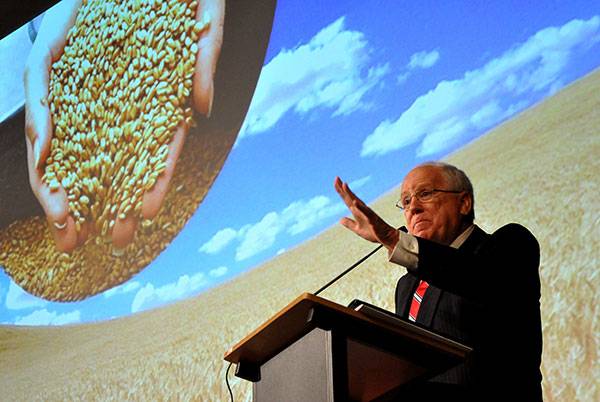Search
Amb. Quinn will continue Norman Borlaug’s legacy of bridging divides to improve food security worldwide.
Des Moines, Iowa (August 25, 2014) -- The President of The World Food Prize Foundation, Ambassador Kenneth M. Quinn, will travel to Iran on August 26, 2014, to address a Centennial Observance Celebration for Dr. Norman E. Borlaug, the great agricultural scientist and humanitarian who won the Nobel Peace Prize in 1970 for his role as Father of the Green Revolution and for alleviating world hunger.

Amb. Quinn and other representatives of The World Food Prize, which Borlaug founded, have participated in numerous events this year honoring Borlaug’s legacy. This year marks the 100th anniversary of his birth, and events have called on his inspiration, especially as we focus globally on the challenge of sustainably and nutritiously feeding our growing world population.
Among the places Amb. Quinn has spoken are:
- the United Nations' World Food Day Observance in New York;
- the World Farmers Organization's global conference in Buenos Aires, Argentina;
- the Sasakawa Africa Association Borlaug Centennial conference in Jinja, Uganda;
- the USDA youth symposium in Washington, D.C.;
- and at the unveiling ceremony for Dr. Borlaug's statue in the U.S. Capitol’s Statuary Hall on March 25, the exact 100th anniversary of Dr. Borlaug's birth.
Other World Food Prize staff members and laureates have taken part in ceremonies honoring Dr. Borlaug during this centennial year in India, Pakistan and Mexico, as well.
“Scientific cooperation and collaboration across national borders is essential to controlling and eliminating threats to global food security, such as the wheat rust disease that Iranian scientists have been instrumental in combatting,” Quinn said. “My visit to Iran continues Dr. Borlaug’s legacy. He played a unique and significant role in promoting understanding, particularly among countries that have been serious adversaries, and his leadership always illustrated how, through scientific cooperation in producing food, confronting hunger and alleviating human suffering, we can help build a more peaceful world.”
In Iran, Amb. Quinn has been invited to take part in a special Borlaug Centennial Ceremony organized by the Agricultural Biotechnology Research Institute of Iran. Amb. Quinn will also participate in the Crop Science Congress of Iran, and the Iranian Seed Science and Technology Conference, where he will address national and international scientists, researchers, policy makers, academics and students.
"Dr. Borlaug was held in high esteem by Iranian agricultural scientists because his 'miracle wheat' developed in the 1960s played a very significant role in enhancing wheat production in that country," Quinn said. "Indeed, Iran's Ministry of Agriculture presented a special gold medal to Dr. Borlaug when he visited the country in the year 2000. Most recently, some Iranian scientists have informally expressed interest in possibly placing a statue of Dr. Borlaug in their country, further reflecting his unique status in the world.
"Dr. Borlaug's life shows that confronting hunger and alleviating human suffering can unite people across very large differences in politics, nationalities, religion or diplomatic relations. The World Food Prize carries on his legacy by annually gathering over 1,200 experts and leaders from over 65 countries, and awarding the prize to people who bridge such divisions to improve the human condition, such as in 2012 when Dr. Daniel Hillel, an Israeli citizen, received the prize after being nominated by three individuals from Arab countries."
"Iowa's history is replete with examples of agricultural and humanitarian endeavors that have brought people together and provided openings in strained or volatile relationships,” Quinn said. “Included are Herbert Hoover's taking food to feed the children of the Soviet Union at the end of World War I; the Iowa Hog Lift to Japan which came shortly after World War II; George Washington Carver's sharing nutritional advice with Mahatma Gandhi; Soviet Premier Nikita Khrushchev's visit to the Garst farm at the height of the Cold War; Gov. Robert Ray's assistance to refugees following the end of the Vietnam War; and, of course, Norman Borlaug's staving off famine in India and Pakistan while those two countries were fighting one other. This trip to Iran is being undertaken in this very same spirit."
Iranian scientists are currently playing a significant role in the worldwide effort to defeat the threat of the ever-evolving wheat rust disease, work being led by the Borlaug Global Rust Initiative, spearheaded by World Food Prize Council of Advisors member Dr. Ronnie Coffman.
Press Contact: Megan Forgrave, Director of Communications, mforgrave@worldfoodprize.org, 515-245-3794.
ABOUT THE WORLD FOOD PRIZE: The World Food Prize is the foremost international award recognizing the achievements of individuals who have advanced human development by improving the quality, quantity or availability of food in the world. The Prize was founded in 1986 by Dr. Norman E. Borlaug, recipient of the 1970 Nobel Peace Prize. Since then, the World Food Prize has honored outstanding individuals who have made vital contributions throughout the world. Thirty-nine laureates have been recognized from Bangladesh, Belgium, Brazil, China, Denmark, Ethiopia, Ghana, India, Israel, Mexico, Sierra Leone, Switzerland, the United Kingdom, the United Nations and the United States. The World Food Prize also annually hosts the Borlaug Dialogue international symposium, and several youth education programs including the Global Youth Institute and Borlaug-Ruan International Internship to inspire the next generation to explore careers in agriculture and fighting hunger.


